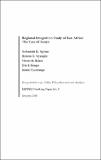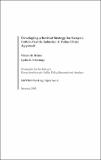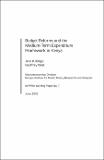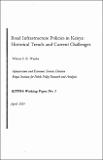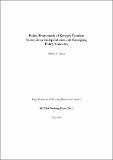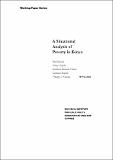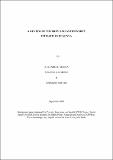Working Papers: Recent submissions
Now showing items 21-34 of 34
-
Working Paper No. 14 of 2006 on Development Finance Institutions in Kenya: Issues and Policy Concerns
(The Kenya Institute for Public Policy Research and Analysis (KIPPRA), 2006)Development Finance Institutions (DFIs) in Kenya were set up to provide longterm finance to prioritized sectors as part of the industrialization strategy. Despite the existence of DFIs since the 1960s and 1970s, there ... -
Working Paper No. 12 of 2005 on Kenya's Reform Experience: What Have We Learnt?
(The Kenya Institute for Public Policy Research and Analysis (KIPPRA), 2005)Kenya has since independence from Britain in 1963 undergone a number of political and economic phases. Like most African countries, Kenya's economy in the 1960s and 1970s was characterised by controls and a protective, ... -
Working Paper No. 13 of 2005 on Tax Reform Experience in Kenya
(The Kenya Institute for Public Policy Research and Analysis (KIPPRA), 2005)Counties all over the world have reformed or are attempting to reform their tax systems, with the main impetus being the increasing complexity of tax codes, narrow tax bases, and concerns with horizontal equity. Kenya's ... -
Working Paper No. 11 of 2004 on a Review of the Health Sector in Kenya
(The Kenya Institute for Public Policy Research and Analysis (KIPPRA), 2004)Since independence in 1963, Kenya has continued to design and implement policies aimed at promoting coverage of and access to modern healthcare in an attempt to attain the long-term objectives of health for all. On ... -
Working Paper No. 09 of 2003 on Regional Integration Study of East Africa: The Case of Kenya
(The Kenya Institute for Public Policy Research and Analysis (KIPPRA), 2003)This study evaluates the costs and benefits of the East African Community Customs Union to Kenya. In particular, the study assesses the potential impact (to Kenya) of removing tariffs on intra-EAC trade and establishing a ... -
Working Paper No. 10 of 2003 on Costs and Benefits of Eliminating Child Labour in Kenya
(The Kenya Institute for Public Policy Research and Analysis (KIPPRA), 2003)The International Labour Organization approximates that about 250 million children worldwide are involved in child labour, with most children working under harmful conditions; that is in circumstances that are detrimental ... -
Working Paper No. 08 of 2003 on Developing a Revival Strategy for Kenya's Cotton-Textile Industry: A Value Chain Approach
(The Kenya Institute for Public Policy Research and Analysis (KIPPRA), 2003)This study was motivated by the huge potential of Kenya’s cotton-textile sector in poverty reduction, its unprecedented decline since the second half of the 1980s and the market opportunities offered by African Growth and ... -
Working Paper No. 07 of 2002 on Budget Reforms and the Medium-Term Expenditure Framework in Kenya
(The Kenya Institute for Public Policy Research and Analysis (KIPPRA), 2002)Many developing countries in Africa introduced planning systems after attaining independence but very little attention was given to budget systems as a tool for achieving plan targets. Recent recognition of the need to ... -
Working Paper No. 04 of 2001 on Education Indicators in Kenya
(The Kenya Institute for Public Policy Research and Analysis (KIPPRA), 2001)This paper looks at the education indicators and their trends, paying special attention to variations across gender and regions. Although Kenya has made an impressive achievement in the development of education since ... -
Working Paper No. 01 of 2001 on Road Infrastructure Policies in Kenya: Historical Trends and Current Challenges
(The Kenya Institute for Public Policy Research and Analysis (KIPPRA), 2001)Development and maintenance of physical infrastructure are prerequisites for economic growth and poverty reduction, as they influence production costs, employment creation, access to markets, and investment. This paper ... -
Working Paper No. 05 of 2001 on Estimation Procedure and Estimated Results of the KIPPRA-Treasury Macro Model
(The Kenya Institute for Public Policy Research and Analysis (KIPPRA), 2001)This Working Paper specifies and estimates the theoretical equations behind the KIPPRA-Treasury Macro Model (KTMM). The review heavily draws on previous macro models of Kenya, such as the Chakrabarti--or the macro economic ... -
Working Paper No. 02 of 2001 on Policy Framework of Kenya's Tourism Sector since Independence and Emerging Policy Concerns.
(The Kenya Institute for Public Policy Research and Analysis (KIPPRA), 2001)Tourism is an important sector in Kenya, being the third largest foreign exchange earner after horticulture and tea. The sector is also a major employer with substantial direct, indirect, and induced employment effects. ... -
Working Paper No. 06 of 2002 on a Situational Analysis of Poverty in Kenya
(The Kenya Institute for Public Policy Research and Analysis (KIPPRA), 2001)Poverty is a major social and economic concern in Kenya. According to the 1997 welfare monitoring survey, more than half of Kenya’s population is poor. The government, together with donors, the private sector, the civil ... -
Working Paper No. 03 of 2000 on a Review of Poverty and Anti-poverty Initiatives in Kenya
(The Kenya Institute for Public Policy Research and Analysis (KIPPRA), 2000)Poverty in Kenya is caused by a number of factors, which include a high degree of inequality of income and production resources, inequality in the access to economic and social goods and services and in the participation ...





